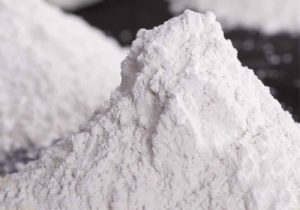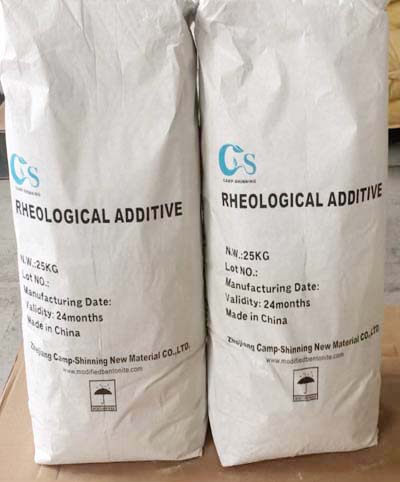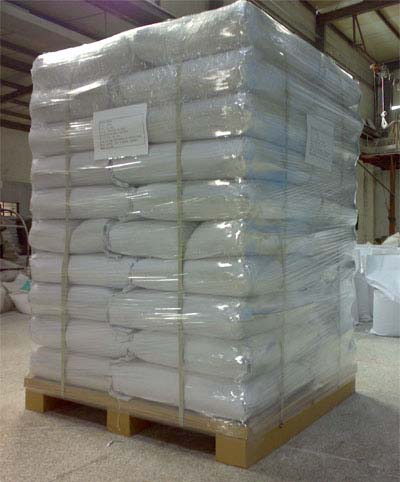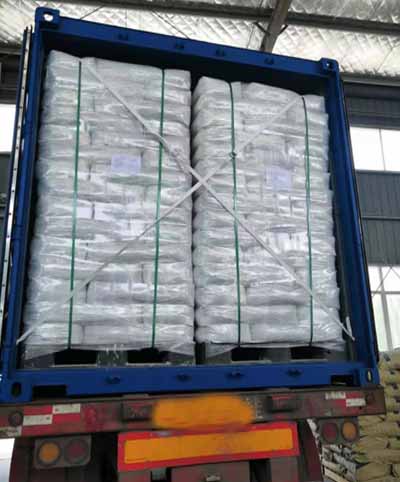
CP-992 Organophilic clay
CP-992 Organophilic Clay, the wet process improved viscosifier and gelling agent . It is a rapidly dispersing.
Camp Shinning’s expertise in producing high quality organoclay bentonite with thixotropic and rheological properties.
Our Organic Bentonite Clay, selected from uncontaminated and high quality mines, is strictly screened and scientifically purified to extract the superior montmorillonite components, which is favored by users for its unique adsorption, ion exchange capacity and high swelling properties.
Currently, our thickening rheological agents can be used in paints and coatings, cosmetics, lubricants, oilfield drilling fluids and inks.Camp Shinning strictly follows the ISO standard production management, and samples of all orders are kept for the stability and consistency of the quality of all orders.

Organoclay Supplier / Manufacturer :
Internet address: https://www.rheologymodifiers.com/
Email address: [email protected]
Whatsapp / Wechat: +86-13185071071
Organophilic Clay Supplier / Manufacturer :

CP-992 Organophilic Clay, the wet process improved viscosifier and gelling agent . It is a rapidly dispersing.

CP-982 Organophilic Clay is an amine treated bentonite with a moderate temperature performance.

CP-150 Organophilic Clay is a self-activating organoclay that disperses easily and performs well in diesel, low aromatic mineral oil, modified vegetable oil, and synthetic base fluid formulations.

CP-10 organoclay is a rheological additive made of organoclay. It is used in non-polar to moderately polar aliphatic and other solvent systems

CP-MPZ organoclays is an modified bentonite that is used in solvent and resin systems ranging from non-polar to highly polar.

The CP-MPS rheology modifier is a type of organo clay rheological additive that is used in solvent and resin systems ranging from non-polar to high polarity.




CP-EW Organoclay for Water Based paint. It is primarily employed in water borne paint systems,such as latex paint. So it is a good water based additive in paints,coatings,grease etc.

CP-EWS Modified bentonite It is employed in a water-borne coatings system. CP-EWS organoclay outperforms CP-EW in terms of thixotropy, transparence, and dispersion.

CP-WBS Rheology Modifier is rheological modified bentonite. It is mostly employed in water-borne systems.
organoclay bentonite | Organophilic Clay CP-2 also named amine treated Bentonite.
In diesel oil based fluids,organophilic clay viscosifier CP-2 are used to increase carrying capacity and suspension properties, providing support for weight materials and improved cutting removal. Organophilic bentonite also aids in filter-cake formation and filtration control.
Properties
Composition Organically modified bentonite clay
Physical appearance Off white to tan free-flowing powder
Moisture content (105℃,2hr) ≤4%
Particle size (<76μm or 200mesh) ≥95%
Specific Gravity 1.6-1.8
Advantages
Effective viscosifier and gellant
Aids control of fluid loss to the formation
Increases emulsion stability
Improves cuttings carrying and hole cleaning capacity
Suspends weighting materials and other solids
Confers temperature stability to the fluid
Application
Base oil:
Diesel Oils
Crude Oils
Mineral Oils
Synthetic Oil
Viscosifying drilling Fluids:
Oil based drilling fluids
Invert emulsion fluids
Workover fluids
Completion fluids
Casing packs
Packer fluids
Spotting fluids
Package
Organoclay | Organophilic Clay CP-2 is packed in 50lb(22.7kg) or 25kg/bag or customized,multi-wall paper sacks or Kraft paper bag with PE liner or customized.
Storage
CP-2 Store in a dry, well-ventilated area with temperature of 0℃-30℃. Keep container closed. The quality guarantee period is 24 months.
Notice
The information on use is based on data which are believed reliable, but any recommendation or suggestion made is without guarantee or warranty, since the conditions of use are outside our control. All products are sold on the conditions that purchasers shall make their own tests to determine the suitability of such products for their purpose and that all risks are assumed by user. We disclaim any responsibility for damages resulting from careless or improper handling or use. Nothing herein is to be taken as permission, inducement or recommendation to practice any patented invention without a license.
Internet address: https://www.rheologicaladditive.com/ and email address: [email protected]
Whatsapp / Wechat: +86-13185071071
organoclay bentonite
The advantages of quaternary ammonium modified bentonite include improved adsorption properties, improved dispersion properties, and improved thixotropy and rheology.
Currently, the main preparation methods include dry and wet methods.
In terms of application areas, organoclay bentonite is used in paints and coatings, inks, greases, cosmetics, oilfield drilling fluids, sealants, and so on. Bentonite has a layered structure with exchangeable cations between the layers.
The modification of organoclay bentonite can be realized through the exchange of quaternary ammonium salt cations with the cations between the layers of bentonite.
Bentonite containing 20% to 30% water and organic modifiers (quaternary ammonium salt) directly mixed, heated, mixed and extruded to produce organic bentonite directly. Or further drying, crushing into powdered products.
Dry preparation process is simple, but usually need to be carried out under high pressure or surfactant melting temperature, energy consumption, and the homogeneity and stability of the resulting product may be affected. This is the dry preparation of organic bentonite.
Bentonite minerals are crushed and dispersed in water to make a slurry, and then organic modifiers (quaternary ammonium salts) are added, and the reaction is carried out under sufficiently stirred conditions to achieve the purpose of organicization.
Wet synthesis of equipment and operation requirements are relatively low, and the preparation process is easier to control, so it is currently the preparation of organoclay bentonite commonly used methods, which is the wet preparation of bentonite.
The amount of quaternary ammonium modified bentonite has an important relationship with the specific application area, the desired effect, and the quality of the modified bentonite. Therefore, the specific dosage standard can be obtained through experiments.
In cosmetics, detergents and other daily chemical field, quaternary ammonium salt modified bentonite as a rheological additives or thickeners, its dosage will usually be based on the product formulation and performance requirements to determine the recommended amount of 1% to 3%, can be adjusted according to actual needs.
In the field of paints and coatings, quaternary ammonium salt modified bentonite as a paint improver, its dosage will also be determined according to the type of paint and coating, the system and the requirements to be achieved and other factors.
Generally speaking, it is recommended to conduct a test before use to determine the optimal dosage, and we generally recommend a dosage of 2%-5%.
The dosage of quaternary ammonium modified bentonite depends not only on its own quality, but is also influenced by factors such as the rectification chemical formulation.
Different types of formulations and modification processes may result in different properties of modified bentonite, thus affecting its dosage.